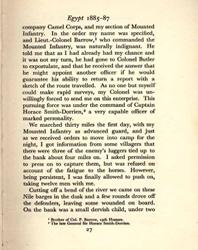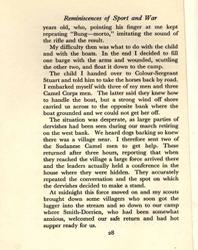In this document, a short history and Record of Service of the 2nd Battalion of the Durham Light Infantry (106th Light Infantry), we have an account of the Battalion being sent to Egypt and taking part in the Battle of Ginnis.
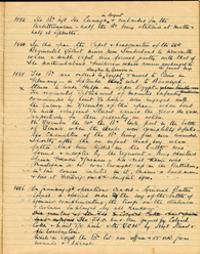

The document refers to Lieutenant de Lisle and Sergeant Stuart of the The Mounted Infantry and the finding of Jimmy Durham:
‘Shortly after this an infant Arab boy whose father had been killed in the battle was found and adopted by the Regiment – being christened James Francis Durham – his real name was Mustapha – he was brought up in the Battalion, in due course enlisted in it, became a bandsman, and died at Fermoy on 8th August 1910’
.
See a full transcript of the ‘History of 2nd Battalion for 1885’.
This document, the Record of Services of the Durham Light Infantry (2nd Battalion), records what happened after the Battle of Ginnis:
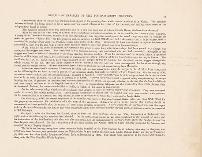

‘After the rout of the Arab army at Ginnis, it was considered advisable to capture, as far as possible, the enemy’s river transport.’
The Mounted Infantry, under the command of Lieutenant de Lisle set off to do so, and approached ‘a large nuggar with a considerable number of the enemy on board.
When within sixty yards of the boat, the command was given to open fire; after three volleys had been poured in, a charge was made, and the nuggar was seized. The Arabs fled in the darkness, leaving only one behind who was badly wounded.
In 1894, when Jimmy was about 9 years old, The Bugle included the story of his life to date, how ‘fate has caused this small warrior from Central Africa to cast in his lot with an English Regiment which his affectionate progenitors would have been only too pleased to remove from this vale of grief and woe.’
It goes on to recount how he was found:
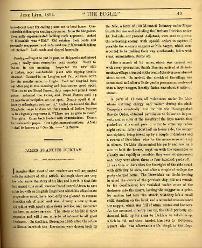

‘After about half an hours ride, the nuggar was sighted, being towed up by a couple of donkeys and a swarm of Dervishes who for the nonce were working in silence. De Lisle dismounted his party and leaving 3 men to hold the horses, crept on with the remainder as silently and rapidly as possible; they were not discovered until they were about three or four hundred yards off. It was then so dark that the foresight of the rifle could with difficulty be seen, and after a couple of volleys the party charged home. The Derwishes no doubt bearing in mind the events of the previous day [Battle of Ginnis], did not remain to try conclusions; but vanished under cover of the darkness into the desert, leaving the nuggar as a prize. So sudden had been the attack, that they left a small child standing on the bank and a wounded man on board the nuggar, which was full of arms, stores and banners. As the mounted infantry ran up, the child perfectly undaunted held up its arms to De Lisle to take him up, which he did, and then handed him over to Sergeant Stuart’
In this account of the finding of Jimmy Durham, more details are included about the wounded man on board the nuggar, whose ‘limb was badly smashed’
, so that ‘some time later the leg was amputated.’
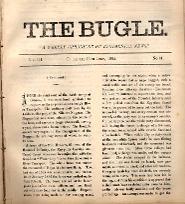

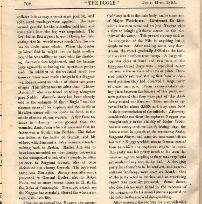

It adds that ‘Jimmy was afterwards presented to General Butler, also to Baker Pasha, and in more recent times to H.R.H. the Duke of Connaught. The night attack on the Nuggar has certainly altered the course of the lads life’.
See a transcript of this article from The Bugle, 11 July 1895, pp.701-702.
In this document, Captain de Lisle reminisces to colleagues in the Liquor Bar about finding Jimmy Durham after the Battle of Ginnis, when he captured the Egyptian nuggar.
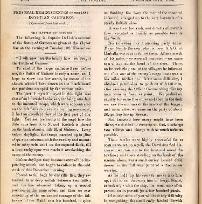



“…and there standing on the bank of the stream alone, was a small curly headed child dressed in the full war paint of a Soudanese warrior. As he held up his arms for me to take him up, I did so and throwing him to Sergt. Stuart, to look after with the ship, the remainder of us pressed on in pursuit for a few hundred yards. Of course none of you will have any difficulty in recognising the small curly headed dervish child in this young chap Jimmy Durham, who now sits in front of you.”
See a transcript of The Bugle, 19 November 1896, pp.1394-1395.
De Lisle committed his reminiscences to print many years later, when he was retired, recalling:
‘On the bank was a small dervish child, under two years old, who, pointing his finger at me kept repeating ‘Bung – morto’, imitating the sound of the rifle and the result.
My difficulty then was what to do with the child and with the boats…
The child I handed over to Colour-Sergeant Stuart and told him to take the horses back by road…
